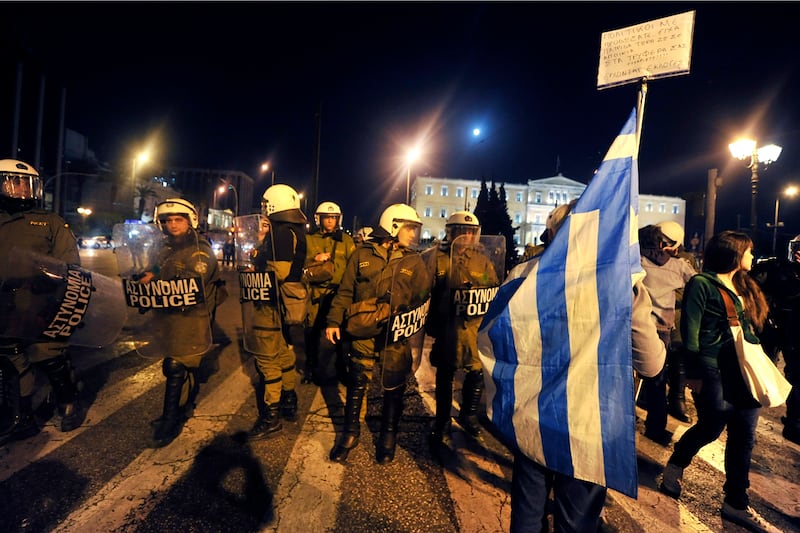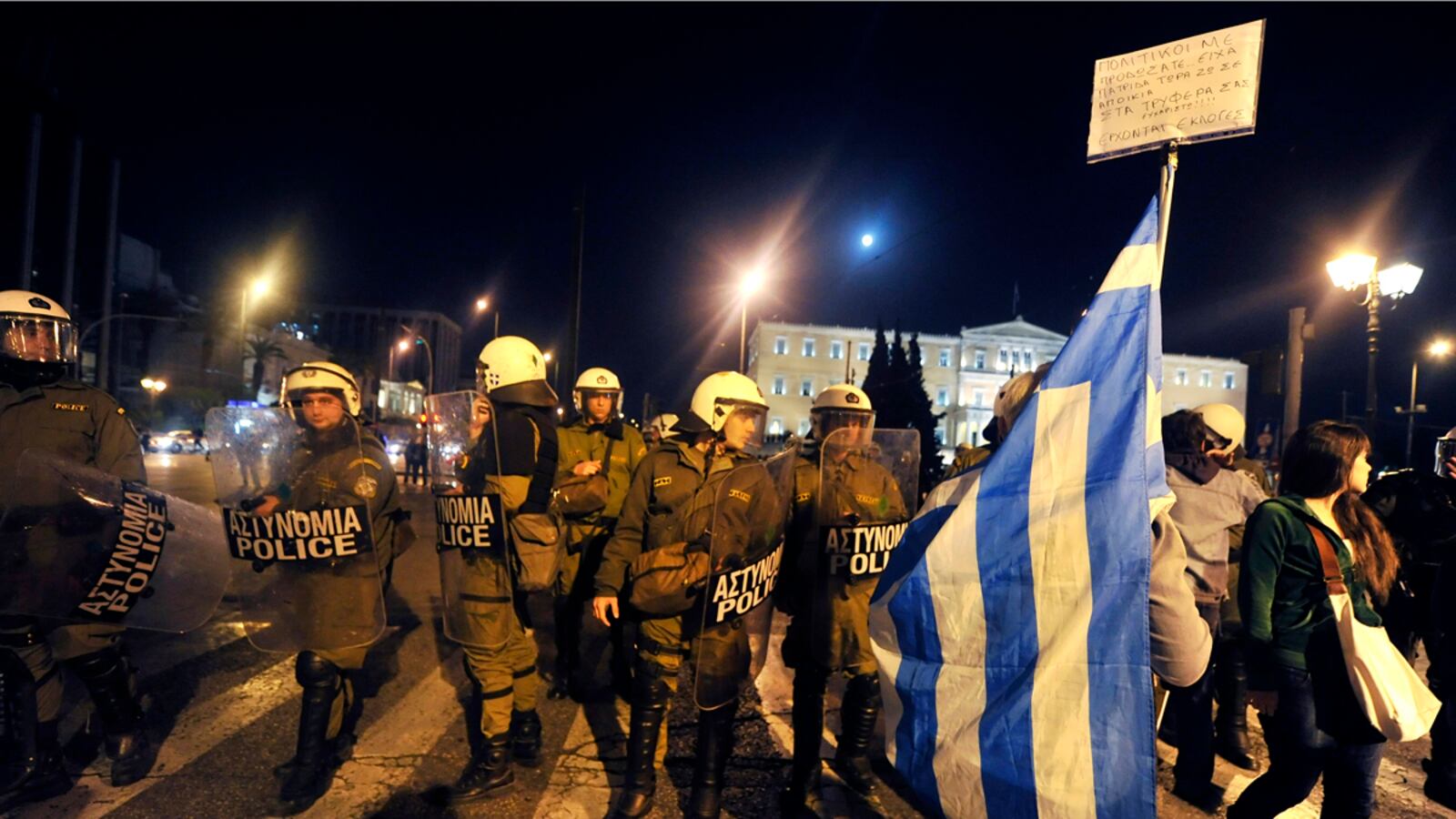For the third May in a row, events in Greece have taken on global significance. The spark this May, the rising debts and plunging growth of the onetime hub of civilization, is largely the same. But why does the fate of a country with not quite 11 million people and about $300 billion in GDP matter so much? Why does a nation with barely more people than one new Chinese city and an economy hardly larger than the state of Maryland continue to roil international markets? Not since the Trojan War has the fate of the Hellenes been so central to humankind.
There are two simple questions to ask: whether the fate of Greece presents a tangible threat to the economic health of the world, and whether we should be worried. The answer, while not quite so simple, is yes, we should be concerned, but not too concerned.
The Greek train wreck is one element of the larger sovereign debt crisis buffeting Europe. That crisis seemed to abate in late November, when the European Central Bank acted swiftly to halt a breakdown in financial markets. By then, the concerns about Greece had spiraled in generalized panic about debt in Europe, especially in the much larger economies of Spain and Italy. As that crisis abated, the Greek government agreed to stringent austerity measures followed by restructuring—i.e., writing off—a large portion of the $300 billion in debt held by private creditors.
But elections in Greece this week have thrown things into chaos once again. The Greek people, it turns out, have had it with austerity and slumping growth. They believe they are being punished unfairly by stern Germans and assorted northern Europeans, and they see no end in sight to declining standards of living, astronomical unemployment, and humiliation. Hence the sudden prominence of a messy coalition of former communists, anarchists, greens, and others on the left in a resounding “we’re as mad as hell and not going to take it anymore” election that left no one able to form a government and new elections scheduled for June.
That still prompts a question: why does this matter so much? Governments rise and fall all over the world with numbing regularity, and some default on their debts, and life goes on. Greece, however, has become a metaphor for Europe, and its unraveling within the single currency of the euro has raised legitimate fears that as Greece goes, so goes all of Europe, which represents nearly a quarter of the global economy.

Greece matters because the European financial system is bound together by the euro, and no one can see a path to Greece completely defaulting (it has already partly defaulted) or leaving the euro zone without setting off a chain reaction that spreads not just to Italy and Spain but to France and finally to the rest of the more stable, balanced northern economies. And that, then, would inevitably spread around the world as the global financial system suffered the shocks of a European financial meltdown. No one could or would be fully immune.
It is easy enough to chart a course that gets you to some really nightmarish scenarios. Major banks nationalized, shareholders wiped out, pensioners bereft, governments scrambling for cash, printing money, widespread devaluation of currencies, American financial institutions pulling up the drawbridges and hoarding even more money, and the dominos falling in rapid succession. These fears have not faded much in the past two years, and they are intensifying once again.
Combine that with zero growth in Europe and very high unemployment in the southern tier and you have a problem of more austerity and shaky financial systems combined with rising debt and despairing populations. All of this leads to some fringe voices on the political scene becoming less and less fringe by the day; hence, what is happening in Greece.
Yet as has been true to date, the costs are monumentally high and the risks are well understood. History is only a guide to what is possible, but rarely has the worst happened when everyone is completely aware of the risks. Complacency and denial have often been at the core of the worst meltdowns, yet today the financial world and the political class, not to mention anyone even partly tuned in to the news, have been grappling with these risks with eyes wide open. That doesn’t mean solutions have been found, but the worst crises have been averted.
Furthermore, the tools exist to keep the larger system solvent. Yes, actions by central banks don’t solve the long-term issues besetting Greece or Europe or the United States, specifically the mismatch between guarantees of a safety net and current levels of growth. But they do keep the worst nightmares from becoming reality. The European Central Bank has acted when needed, as has the Federal Reserve and every other central bank in the world. Those actions may “kick the can down the road,” but they maintain just enough order. And for all of the failings of Europe, it is still an assemblage of the richest nations on earth, and even a stagnant Europe is a source of massive consumption, output, and a very high quality of life for most of its citizens.
What remains most frightening is the fragility of the markets and the obsession with impending doom. That lens is as distorted as the Pollyannaish mantras of the 1990s, both in Europe and America, that the future would unfold brightly. We are now in the grip of a collective spiral of diminished expectations and escalating fears.
The situation for Greece itself is grim. Government accounted for as much as 40 percent of the economy a few years ago, and that government cannot meet those commitments. It has guaranteed millions of people a life it can no longer afford, and that is a recipe for some very, very hard times. Spain as well faces untenably high unemployment and a frozen real-estate market. And few countries—including, of course, the United States—are without challenges in the mismatch between spending and income.
Yet this all unfolds against a backdrop of a rapidly evolving global system in which hundreds of millions of people are emerging out of poverty and claiming their place as part of the middle class. That is small comfort to 11 million Greeks, but it is real ballast for the interlinked global system that sustains most of us directly or indirectly. So, yes, be wary of Greek dominos falling, but remember the domino theory was wrong during the Cold War yet it sowed fear. You never know the future, but it’s worth keeping in mind that dominos only fall when they are actual dominos, and even with nuclear weapons, chain reactions are difficult to create.





